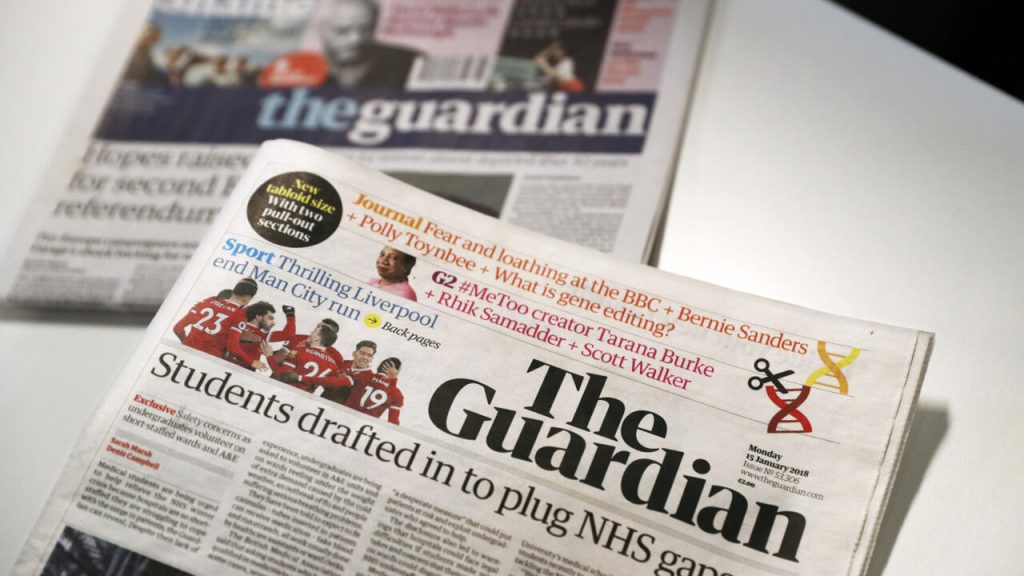The Guardian stops posting on Elon Musk’s ‘toxic’ X
4 min read
Copies of the British, left-leaning newspaper, The Guardian. © Adrian Dennis, AFP

Copies of the British, left-leaning newspaper, The Guardian. © Adrian Dennis, AFP
The Guardian, one of the UK’s leading newspapers, has decided to stop posting on X (formerly Twitter), citing concerns that the platform has become “toxic” under its new owner, Elon Musk. The decision marks a significant shift for the newspaper, which had previously maintained an active presence on the platform.
In a statement to its readers, The Guardian explained that its decision was prompted by the growing influence of Musk on X, particularly his political leanings. The newspaper specifically pointed to the US presidential election as a key factor that underscored its concerns, noting that Musk’s ownership of the platform has allowed him to “shape political discourse.” The billionaire’s strong support for former President Donald Trump and his role in Trump’s upcoming administration were also key reasons behind the decision. Musk’s recent political ties and influence over the platform were seen as incompatible with The Guardian’s editorial stance.
The Guardian clarified that while it would no longer post directly on X, its content would still be shared on the platform by users, and the newspaper would likely continue to embed X posts in its coverage of world events. Reporters would also continue using the platform for news-gathering purposes, but the newspaper emphasized that the “negatives” of being on X now outweighed the benefits.
The Guardian cited several reasons for its decision, including the disturbing content often promoted on the platform, such as far-right conspiracy theories and racism. These concerns, coupled with Musk’s increasing political involvement, led the paper to conclude that its presence on X was no longer tenable.
The announcement was made public on X, which prompted a flurry of reactions from users. Many of those who had paid for prominent replies accused The Guardian of “woke propaganda” and “virtue signalling.” These responses highlight the polarized atmosphere on X, particularly since Musk took control of the platform in late 2022.
Musk and The Guardian are politically far apart, and the move is not surprising, given their differing stances. Musk, a vocal supporter of Trump, has also been criticized for his decision to loosen content moderation on X, which some argue has allowed harmful content to proliferate. Meanwhile, The Guardian, which describes itself as “the world’s leading liberal voice,” has increasingly positioned itself as a key part of the “resistance” to Trump’s influence.
In fact, The Guardian’s decision to sever ties with X seems part of a broader strategy to underscore its independence from billionaire ownership, which it views as an important distinction in an era of growing media consolidation. The paper is also using its departure to highlight its role in advocating for values like fairness and transparency, particularly as it competes with news organizations funded by billionaires like Musk.
This shift comes at a time when The Guardian is experiencing a surge in reader support. Following the US election, the newspaper raised more than $1.8 million in a single day from reader donations, setting a record for its fundraising efforts. The increased support signals that some readers are rallying behind media outlets that position themselves as adversaries to the political forces that Trump represents. Ben Mullin, a media reporter for the New York Times, described this trend as a sign that some outlets are tapping into a surge of enthusiasm for adversarial journalism following the election.
The Guardian’s move is likely to fuel further questions about whether other major media organizations will follow suit and pull back from X. In the meantime, rival platforms are continuing to grow. Meta’s Threads has steadily expanded its user base, while Bluesky, a decentralized platform created by Twitter founder Jack Dorsey, briefly topped the download charts in the UK and US App Stores. Bluesky has seen impressive growth, adding four million new users in just two months and a million new users in the week following Trump’s victory. However, with only 15 million users worldwide, Bluesky remains a relatively small player in the social media space compared to X.
While X remains a powerful platform with a large and engaged user base, the growing exodus of media organizations and users who feel disillusioned with its direction under Musk’s leadership could lead to further fragmentation of the social media landscape. The Guardian’s decision to leave X reflects broader concerns about the platform’s role in shaping political discourse and the impact of Musk’s controversial management on the health of public conversation. Whether other media outlets will follow The Guardian’s lead or continue to engage with the platform remains to be seen, but the newspaper’s move signals a potential shift in how the media interacts with social platforms in the future.